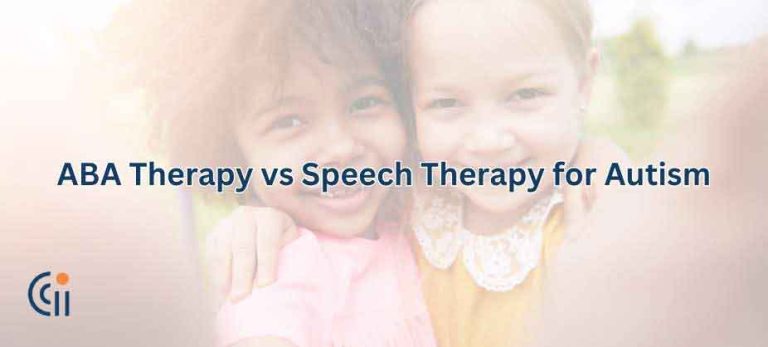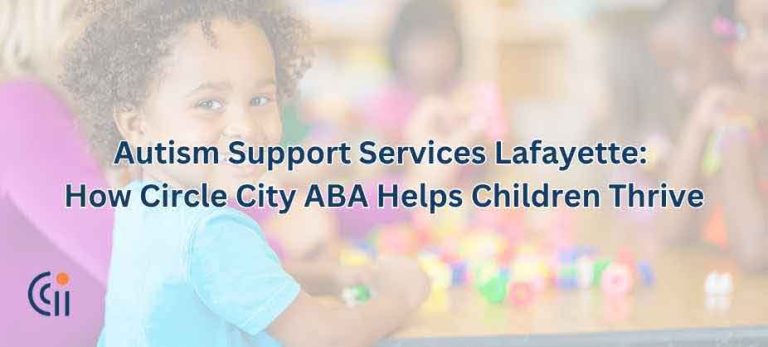Autism spectrum disorder (ASD) is a lifelong developmental disability. While there is no one-size-fits-all solution for children living with autism, there are many benefits to Applied Behavior Analysis (ABA) therapy services. ABA therapy is a proven effective way to help improve social, communication, and behavioral outcomes for individuals living with autism. At Circle City ABA, we are passionate about nurturing progress through play with ABA therapy and providing full-family education and support from day one.
What Is Applied Behavior Analysis (ABA)?
Applied behavior analysis (ABA) is a science-based approach focusing on understanding how people learn and develop new behaviors. It seeks to motivate positive behaviors while reducing or eliminating problem behaviors to promote better functioning socially, academically, and occupationally. First, ABA looks at the factors that might influence a person’s behavior in different situations. Then, careful observation and data collection can help identify which interventions work best in each situation. For example, suppose a child is exhibiting aggressive behavior when asked to do something they don’t want. In that case, an intervention such as positive reinforcement might encourage them to complete the task without aggression.
At Circle City ABA, our Board Certified Behavior Analysts (BCBAs) have extensive knowledge of evidence-based practices tailored to meet individual needs and goals. We create individualized treatment plans based on each child’s unique strengths and challenges that can be implemented within the home or school environment under the guidance of our BCBAs so that parents can continue the interventions even after their child finishes receiving services from us. Our goal is for children with autism to feel safe and supported throughout their journey towards success.
Benefits of ABA Therapy Services for Autism
- Individualized Treatment Plans: ABA services are highly individualized, recognizing the unique strengths and challenges of each person with autism. This personalized approach allows for the creation of targeted treatment plans that address specific needs, ensuring more effective outcomes.
- Skill Development: ABA interventions focus on teaching new skills and fostering independence. Whether it’s improving communication, enhancing social interactions, or acquiring daily living skills, ABA services help individuals with autism build a repertoire of abilities that contribute to their overall development.
- Behavior Modification: ABA is renowned for its success in behavior modification. Through positive reinforcement and other behavior management techniques, undesirable behaviors can be reduced, and more adaptive behaviors can be encouraged. This not only improves the individual’s quality of life but also aids in creating a supportive environment for families and caregivers.
- Early Intervention: Research suggests that early intervention with ABA services can lead to significant improvements in outcomes for individuals with autism. The earlier the intervention begins, the greater the likelihood of positive changes in behavior, communication, and social skills.
- Generalization of Skills: ABA emphasizes the generalization of skills, ensuring that the individual can apply what they have learned across various settings and situations. This is crucial for promoting independence and functional integration into society.
About Circle City ABA
At Circle City ABA, we understand that caring for children with autism also means caring about their families. So, we provide full family education and support from day one to ensure everyone feels welcome in our clinic space. Circe City ABA believes in being proactive rather than reactive when addressing problem behaviors so children can return to learning mode quicker and more effectively. If you want a personalized approach to helping your child thrive while living with autism, visit circlectiyaba.com today! We will walk through this journey towards progress together as a family – one step at a time!
Sources Supporting ABA Efficacy
- Smith, T. (2001). Discrete Trial Training in the Treatment of Autism. Focus on Autism and Other Developmental Disabilities, 16(2), 86–92. – This study explores the effectiveness of Discrete Trial Training, a component of ABA, in improving language and cognitive skills in children with autism.
- National Autism Center. (2009). National Standards Report. – The National Standards Report provides an extensive review of research on various autism interventions, highlighting ABA as one of the most well-established and scientifically supported approaches.
- Eldevik, S., et al. (2009). The Use of Evidence-Based Practice in an Autism-Specific Early Intervention Center. Behavior Modification, 33(6), 773–789. – This study examines the implementation of evidence-based practices, including ABA, in an early intervention center for children with autism.


